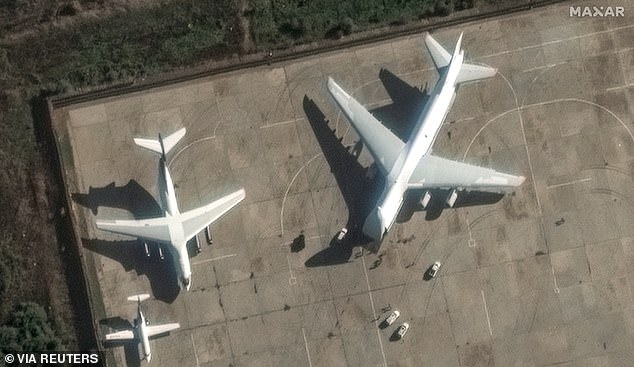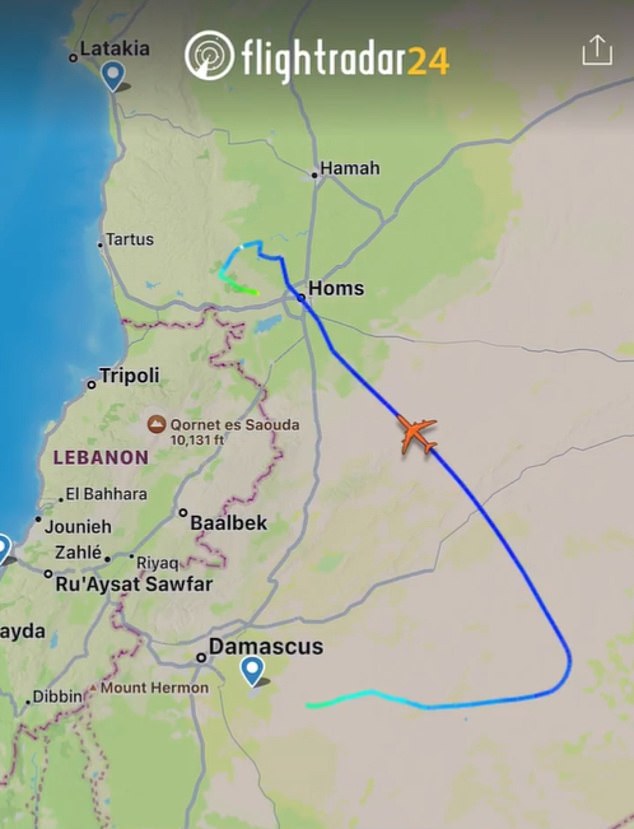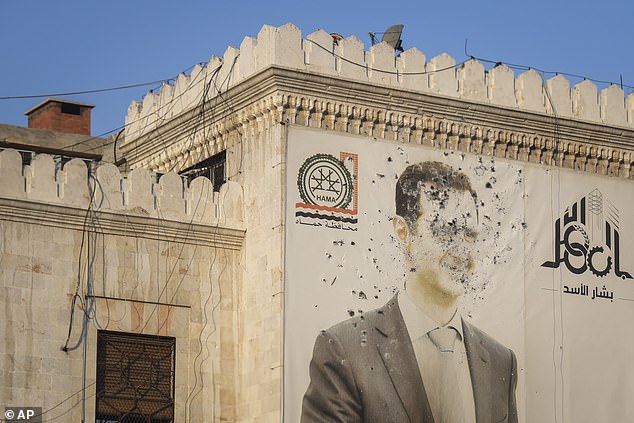Assad’s great escape: How Syria dictator fled the capital on private jet, dodged flight tracker, then switched planes at Russian airbase before flying to Moscow in Russian military plane
Bashar Al-Assad’s desperate escape from Syria as his regime collapsed was planned by Russia and kept secret from even his closest aides and relatives, sources have revealed.
As rebel fighters approached Damascus, it became clear that the brutal dictator’s fate was sealed, and Moscow decided to intervene to get him out of the country.
He told no one about the plans and boarded his private jet from the capital’s airport in the early hours of December 8.
The plane flew towards the Mediterranean Sea before disappearing from the map, apparently when pilots switched off the transponder that tracks flights and reports their position to air traffic control.
It disappeared shortly after making a U-turn as it made its way over the city of Homs – apparently along the route to Russia’s Hmeimim airbase in the northeastern city of Latakia.
The presidential plane then reportedly landed at the base, where Assad was transferred to a Russian military plane and flown under the radar to Moscow.
His immediate family, including British-born wife Asma and three adult children, waited there for him after Vladimir Putin granted them asylum.
Within hours of his flight, rebels led by the Islamist group Ha’yat Tahrir al-Sham (HTS) captured the capital Damascus and declared Syria free from its tyranny.
The exile of the Syrian dictator and his family brought the Assad dynasty’s more than 50-year rule and its 24-year reign to a shuddering halt, abruptly ending a bloody 13-year civil war.
Rebels stormed the Assads’ palaces and private homes, with looters taking their hastily abandoned belongings and exposing elements of the dictator’s lavish private life to the world.
Cooked food was even left on the stove, one video showed, while family photo albums and documents were scattered around his official residences.
He apparently broke his silence a week after the dramatic events, but yesterday an astonishing statement was released on Assad’s Presidential Telegram, detailing his final hours in Syria.
It appeared to confirm that he left Damascus for Hmeimim in the early hours of December 8, shortly before Islamist rebels took the city.
But the statement went on to emphasize that he was forced to leave Syria when the Moscow-controlled air base came under drone attacks, prompting Russia to order his evacuation.
“My departure from Syria was not planned and not during the last hours of the fighting, as some claim,” Assad said.
“I remained in Damascus and fulfilled my duties until the early hours of Sunday, December 8, 2024.
“At no time have I considered resigning or seeking refuge, and no such proposal has been made by any individual or party. The only course of action was to continue fighting the terrorist attack.”
Former Syrian President Bashar al-Assad has made his first statement since he was ousted by rebel groups and fled to Russia less than two weeks ago.

An An-124 heavy transport aircraft with its nose cone raised last Friday at the Russian airbase Hmeimim, near Latakia, Syria

Flightradar24 showed a plane heading from the Syrian capital Damascus towards the Mediterranean Sea early on Sunday morning.
Assad portrayed himself as a dedicated leader and family man who remained “by the side of his people” throughout the civil war – even as his forces, allied with Russia, Hezbollah and Iranian-backed militias, were responsible for thousands of deaths.
“I have never sought positions for personal gain, but have always considered myself the guardian of a national project, supported by the faith of the Syrian people,” he said.
He concluded by expressing “the hope that Syria will be free and independent again.”
Reflecting on the disgraced president’s final hours, Nadim Houri, executive director of the Arab Reform Initiative regional think tank, said: “Assad has not even made a last stand. He didn’t even gather his own troops. He made his followers face their own fate.’
On Saturday, hours before fleeing to Moscow, Assad assured a meeting of about 30 military and security chiefs at the Defense Ministry that Russian military support was on the way and urged ground forces to hold their ground, a commander in attendance said reportedly. Reuters.
Civilian staff were also unaware of his plans, the news agency reported. His presidential office manager reportedly told him he was going home on Saturday evening.
Instead, he was heading to the airport, an aide from Assad’s inner circle claimed.

An image of Syrian President Bashar Assad riddled with bullets is seen on the facade of the provincial government office in the aftermath of the opposition’s takeover of Hama, Syria, Friday, December 6, 2024
He also called his media adviser, Buthaina Shaaban, and asked her to come to his house to write a speech for him, the aide said. She arrived to find no one was there.
Assad’s last prime minister, Mohammed Jalali, said he spoke to the then-president on the phone at 10:30 pm on Saturday.
“During our last phone call, I told him how difficult the situation was and that there was a huge displacement (of people) from Homs to Latakia… that there was panic and horror on the streets,” he told Saudi-owned Al Arabiya TV Arabia. this week.
“He replied, ‘We’ll see tomorrow,’” Jalali added. ‘Tomorrow, tomorrow’ was the last thing he said to me.’
Jalali said he tried to call Assad again at dawn on Sunday, but there was no response.
Russian Foreign Minister Sergei Lavrov is believed to have spearheaded diplomatic efforts to ensure Assad’s safety, two regional officials told Reuters.
A Western security source said Lavrov “did everything he could” to secure Assad’s safe departure.
After the humiliating capitulation of his dictatorship, Assad and his family will now start a new life in Russia.
They will likely rely on their family ties and extensive assets in Moscow in the hope of continuing their comfortable lifestyle in exile.
The Financial Times has uncovered data showing that the Assad regime flew two tons of banknotes into Moscow’s Vnukovo airport between 2018 and 2019 to be deposited in Russian banks.
The shipments came at a time when Syria was dependent on military support from Russia, including mercenaries from the Wagner group.
At the same time, Assad’s family began buying large numbers of luxury properties in Moscow, the FT reported.
The Syrian dictator’s extended family has bought up at least 20 Moscow apartments worth more than £30 million in recent years, illustrating Russia’s status as a safe haven for the clan.
This included the purchase of at least 18 luxury apartments in the City of Capitals complex, located in Moscow’s glittering skyscraper district.
The twin-tower skyscraper – which was Europe’s tallest building until the unveiling of London’s Shard in 2012 – is home to some of Russia’s wealthiest businessmen, ministries, five-star hotels and multinationals.
Secret tunnels beneath an Assad family mansion were reportedly discovered at Assad’s former residence in Damascus after rebels took over the capital Damascus on Sunday, with the network serving as a possible escape route for the dictator and his allies.
Meanwhile, the citizens of Syria are trying to rebuild their nation after thirteen years of war and – for the first time in six decades – are looking to a future without the autocratic rule of the Assad family.
While Assad roams Moscow, the Islamist rebel group HTS is trying to control Syria, set up a transitional government and provide aid and services to civilians.
Last week, HTS used state television to announce Mohammad al-Bashir – the head of the group’s so-called “Salvation Government” in Syria’s northwestern province of Idlib – as interim prime minister of a transitional cabinet that will remain in place until March 1.
Concrete moves for an inclusive political transition in Syria will be crucial to ensure the country gets the economic support it needs, United Nations Special Envoy for Syria Geir Pedersen told the Security Council on Tuesday.
‘There is a clear international willingness to participate. The needs are immense and can only be addressed with broad support, including a smooth end to sanctions, appropriate measures including with regard to designation, and full reconstruction,” he said.
